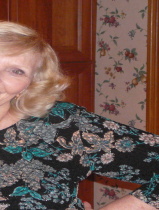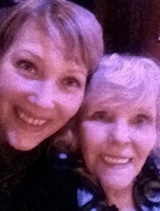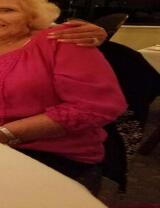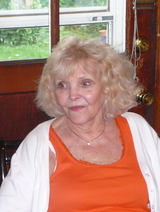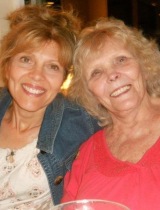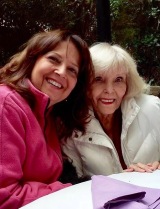Memorial Candle Tribute From
Clayton Funeral Home
"We are honored to provide this Book of Memories to the family."
View full message >>>
Memorial Candle Tribute From
Rhoda and Sheldon Wagner
"May memories of Hedy and the love of family surround you and give you the streng"
View full message >>>
Life Story for Hedy Ramos
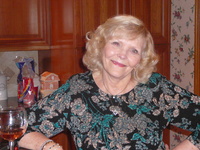
It would be easy to conclude that there isn’t much left to know about the woman who brought you into this world and raised you for 20 years. However, after interviewing my mother, I was surprised to learn that there were many aspects to be discovered.
My mother was born 83 years ago on a large working farm on the island of Aland , in the Baltic Sea, located between Finland and Sweden. She was delivered by a midwife in her parents farm house.my mother has an older sister and a younger brother. Growing up on the farm was simple and carefree for my mom and her siblings. Her parents, however, had to work very hard. During the day, most of the time was spent doing chores. Since the farm was self-sufficient, there was a lot of work to do. There were cows to be milked, sheep to be sheered, crop to be picked, and animals to be fed. The crops consisted of wheat, barley, rye and every kind of fruit and vegetable imaginable. The foods were raised without synthetic pesticides, chemicals or harmful substances.
Life on the farm was certainly not luxurious, it consisted of no plumbing or electricity they had an outhouse equipped with newspaper squares for toilet paper and a chamber pot under their beds for night time emergencies. They collected for cooking and drinking. Electricity came in the form of kerosene lanterns. The lanterns were used for the nightly bible readings, homework and any other night time activity. There wasn’t any heat except for a wood burning pot belly stove in the kitchen and a fireplace in each room.
One of my mother’s oldest memories was when she was a toddler, around three years old, and her brother was being christened. Family members and friends had gathered at their home to witness the ceremony. My mother, who didn’t want any part of this, decided it would be better to sit this one out in her father's study. Looking around she noticed an unfamiliar package. She opened it up and took several sticks out and ate what she thought was candy. Little did she know that these were cigarettes that were being saved for company and were not for eating. Sadly, my mother became ill and spent the night throwing up in the chamber pot. However, she never ate a pack of cigarettes again!
As a child my mother loved the fall harvest time. She and her siblings would get to ride in the horse driven wagon filled with hay. After the hay was placed in the barn, they would jump in, roll around and have lots of fun. Harvest time also meant picking crops, preserving jellies, canning fruits and vegetables and eating delicious foods fresh from the garden.
Winter in Aland was long, dark and cold. It would start snowing around September and would not stop until April. Can you imagine 8 months of snow? This didn’t seem to bother the children for they would cross-country ski, ice-skate, on the lake behind the farmhouse, horseback ride or play in the snow.
Spring and summer made life a little easier. The warmer weather gave way to more outdoor activities, such as hiking, swimming, riding bikes, and playing games.
As life progressed, my mother and siblings were sent off to a one room little red school house. The kind you read about in story books. The grades from one through four were taught in the same room. The first row was for the first grade, the second row for the second grade, and so on. The school was located about a mile or so from the farmhouse. They had to walk to and from school each day, however if there was snow, they would cross-country ski. What a wonderful experience that must have been to be raised on a farm. Even though life on the farm seemed ideal, my grandfather who had previously been an American citizen longed to bring his family back to America. Unfortunately, World War II broke out and no ships were allowed to cross the ocean, not even a ship from a neutral county like Sweden.
During the war, the Finnish soldiers came and occupied the farm. The family had to move out of the main house and live in the small house where the farmhands used to stay. The soldiers lived there for one and a half year, and completely destroyed my grandfather’s handmade furniture. When the war was over, my grandfather sold the farm and livestock, and bought a four-family house in a small city, not too far from where they had lived before. They lived in this house for three years. This house had indoor plumbing and electricity. It was a novelty for the whole family. The kids found it exciting to flush the toilets and play with the lights! Living in a new area meant adjusting to a different school and making new friends. The school had several classrooms for each grade with plumbing and electricity. It didn’t take long for my mother to embrace the modern conveniences. Making friends came easy for my mother, she has a warm presence about her that people seem to adore.
In 1946, my grandfather was notified that he could move to America. At the time of his children’s births, my grandfather had already been an American citizen, which meant that the children were automatically deemed the same. In spite of that, my grandmother was not an American citizen. My grandfather had to leave his wife, my mother and his son behind while he traveled to New York with his eldest daughter. They stayed with my grandfather’s sister and brother-in-law in Brooklyn. Once my grandfather was able to prove that he could support his family, the wife and children were allowed to join him. The four-family house was they sold. My mother, her mother and brother left on a shift called Grips Holmm on January 1st, 1947. The waves were as tall as two-story building. My mother remembers being overcome with Nausea as the ship continued to pitch and roll. The trip was not a pleasant one. The ship finally made its way to Ellis Island, New York after fourteen damp, cold and frigid days. The family stayed in Brooklyn, with my mother’s aunt and uncle. They stayed there for a short time while my grandfather secured an apartment in the Bronx. My grandfather worked very hard as a carpenter and saved his money so that he could buy his family their own home. The family had a hard time adjusting to the new English language, but after about a year they were able to master it.
After four years of living in the Bronx, my grandfather was able to buy a home in Whitestone, Long Island. My mother started working in an office in Manhattan. She started out as a file clerk and worked her way up to secretary. When she started working, her salary was one dollar per hour. Imagine making thirty-two dollars per week before taxes. She got paid every two weeks and gave fifteen dollars to her parents for room and board. With the rest of the money she bought clothes and shoes (which in those days could have easily cost four or five dollars for a good pair of shoes). She was even able to start a savings account.
My mother made many good friends, many of which she still sees today. My mother remembers an incident that she will never forget. It happened one Friday evening when she was around twenty years old. Her girlfriend had invited her to her parent’s nightclub which was located below their apartment. The club was staging a live band at the time. And everything was going great until a holdup man with a gun in his hand a mask on his face walked in, put a gun to my mother’s head and demanded money from the bartender. At this point in the evening, her father’s friend had already brought the money upstairs. The gunman, furious by now, ordered everyone to go to the dance room and line up against the wall. He said, “Where is the owner?” and “where is the money?” Everyone started talking at once, my mom said her knees where shaking. To get some attention, the gunman fired a shot at the wall. As soon as my mother heard the shot, she fainted and fell to the floor. Everyone though that he had shot her and started screaming, “She’s dead!” When she realized what had happened, she continued to lie on the floor. She heard the bandit say “get her some water, call the doctor!” With that he ran out the door. My mom knew it was safe to get up. If she hadn’t fallen down when she did, she most likely would have been hit. The police and newspaper reporters came. The next day there was a picture of my mom taken that night, of her pointing to the hole in the wall, with a caption on top of it reading “girl foils holdup.” Her name and address also appeared in the article. Needless to say, that was not the end of the story. The following night, while she was sleeping, her phone began to ring. At first no one answered, there were just some sounds of heavy breathing. The next time the phone ring, a man claiming to be from the newspaper, wanted to interview her again. His first question was, “would she be able to recognize the bandit if she saw him again?” She said no, as he was wearing a bandana across his face. He said, “that’s good, because I was the man who held up the place.” He kept calling back almost every night for about a week. My grandfather at this point, feared for my mother’s life and would pick her up at the train station every night after work so she wouldn’t have to take the bus. My mother took two weeks’ vacation and went to Kansas City to visit a friend who she used to work with. When she returned home, there were no calls and life returned to normal.
Summers were spent at Jones Beach on Long Island. Winters were cold, not much to do outdoors. Movies, bowling and roller0skating were some common indoor activities. One Sunday afternoon my mother went to a “Tea Dance” with a girlfriend that is where she met my father. He was up on stage singing when she walked in. For my mom, it was love at first sight. After a year of going steady, they were married. My mom quit her job and soon started a family, eventually having five children. When we were small, my parents decided to move from Queens to Long Island. Long island was known to have better public schools more open space, niche neighborhoods, beautiful beaches and so one. Unfortunately, the property taxes were substantially higher. To compensate for the increase in bills, my mother had to get a job. She started working at a large supermarket chain near our house. This enabled her to be close to our schools and home.
Married life had its ups and downs for my mother. You see, my father had a roving eye. So after five kids and twenty-five year of marriage, she finally called it quits. They sold the house on Long Island, and my mother moved into her own apartment with my youngest sister. The rest of us had already been on our own. My mother continued to work and retired after twenty-nine years with a pension and medical benefits. Much of my mother’s time is spent to visit her five children, six grandchildren, and three great-grandchildren.
A child looks to her parent as mostly as caregiver, someone who cooks, cleans and cares for them. It’s hard to see a parent as an individual with her own set of ideas, beliefs, and values, with characteristics that make an interesting person. After hearing my mom’s life story, however, I can now see a very special, unique and independent woman, and I love her very much.
Recently Shared Condolences
-
May you Liz and your f... (read more)
-
I am so glad I got to meet... (read more)
-
Sending our deepest condolences.... (read more)
Recently Lit Candles
-
We are honored to prov ...(read more)
-
May memories of Hedy a ...(read more)
